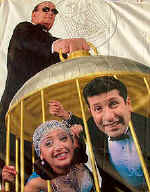The Confusion in the Middle
Gawaz bi Qarar Gomhouri
(Wedding by Republican Decree)
 Amr (Hany
Ramzy)
and Hanan (Hanan Turk) want to get married. They're from the
same neighborhood, but Hanan's parents have recently
"moved on up", and as anyone who's seen the American
sitcom the Jeffersons Amr (Hany
Ramzy)
and Hanan (Hanan Turk) want to get married. They're from the
same neighborhood, but Hanan's parents have recently
"moved on up", and as anyone who's seen the American
sitcom the Jeffersons
can attest, now snub their noses at their former neighbors
from the narrow alleyway, since they live
way up high, in the hills of Mokattem.
Amr and Hanan's love has withstood this seismic class
shift, somehow, and as the film Gawaz bi Qarar Gomhouri
(Wedding by Republican Decree) begins, the
two are being brought into a hospital's intensive care ward
after a faked mutual suicide attempt caused by their parents
disapproval of their impending marriage.
Both Amr and Hanan are wearing t-shirts with the other's photo
on it, and that sight gag -- from the film's very get-go --
establishes the level of seriousness with which the
characters, and the plot they're about to go through, should
be taken.
While waiting 8 years after graduation for a job he deserves
at the Foreign Ministry, Amr drives a microbus. When he
finally gets his dream job, it ends up being in the Ministry's
archives, a far cry from
the diplomatic ambitions he'd been harboring. It would
certainly not be a stretch to say that Sami Sarhan, who plays
Amr's boss, has become the modern cinematic archetype of the
obnoxious old style boss who doesn't like or encourage youth
in any way. We've seen him play this same role in at least 3
films in the last two years.
Amr's dad, meanwhile, a film extra with dreams of being a
star, but whose largest ever part in decades of work was a
one-liner, is barely surviving,. So when it comes time to plan
the wedding, Amr finds himself trying to decide whether he's
going to serve his guests a basterma sandwich and a piece of
gateaux or just a sandwich, while Hanan's dad is inviting all
sorts of big wigs to the party.
Wanting to feel important in some way, on a whim, Amr decides
to mail out a wedding invitation to the President.
When his invitation is accepted, Amr becomes a celebrity, an
overnight VIP, practically a minister without portfolio. Now
that he's going meet the president, everyone wants him to ask
for a favor on
their behalf . He is inundated with requests, just like anyone
who comes into some authority. He gets letters by the hundreds
from people all across the country, wanting help with their
problems. Even
the big wigs -- the governor, the parliament rep from the
neighborhood -- they all want favors. Even his best friend and
former co-worker on the microbus, starts charging people for
the right to have a word with Amr.
Amr's status -- as well as that of his family -- instantly
rises. At work, he gets a desk with a computer, so his
colleagues can all admire him play games. His father, the
extra, becomes a star, now pampered by the same director who
previously kicked him off the
set (a cameo played by the film's own director Khaled Youssef).
His mother, who is illterate, becomes a member of the
Lioness's Club.
His alleyway -- Mammoun al-Qird (Maamoun the Monkey) is
renamed Maamoun bik Al-Qird (Sir Maamoun the Monkey).
Then, disaster strikes -- the class difference issue comes up
again, and Amr breaks up with Hanan. But now their wedding is
too important to cancel. Whole government agencies are
assigned to try and get them back together. Peace summits take
place in Sharm
El-Sheikh. The media is following the issue closely, with the
government denying rumors that the wedding is off.
There's a scene here where the way forlorn lovers sit and sulk
in their rooms, living out their failed love stories through
sappy pop music, is successfully made fun of, and another
surreal moment when one of the only things slightly convincing
Amr to get back together with Hanan is finding out that
Shaaban Abdel-Rehim sang a song asking him to.
It's moments like this -- when the film manages to achieve
just the right amount of silly, that it points to some of the
odder of our modern tendencies, achieving a surreal type of
comedy that is far more edifying than the sight gags or
one-liners that otherwise litter it.
The film's strength lies in how it portrays the way everybody
confuses what the leader wants with what they think he wants
-- the common syndrome of the office manager thinking he knows
more about what the boss wants than the boss himself. Here it
is portrayed in the debate about whether the wedding should
take
place in an alleyway or a hotel. This cinematic attempt is
perhaps most worthy for its exploration -- silly as it may be
-- of why even if it does take place in the alleyway, the
alleyway is spruced up
though the president specifically said he wanted to get a real
look at how the average citizen lives.
|